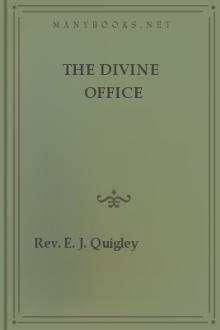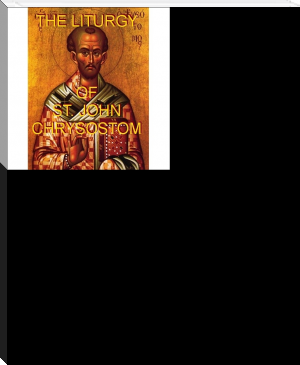The Divine Office, Edward J. Quigley [best book reader .txt] 📗

- Author: Edward J. Quigley
- Performer: -
Book online «The Divine Office, Edward J. Quigley [best book reader .txt] 📗». Author Edward J. Quigley
This Canon seems to make it clear that the second condition is fulfilled in all the parishes of these Kingdoms, since to the sacred office is attached the right of receiving revenue from the certain and voluntary offerings of the faithful or from stole fees or from both.
The third condition, erection by ecclesiastical authority, is qualified by Canon 1418 which prescribes that benefices should be erected by a legitimate document defining the place of the benefice, its endowment and the duties and rights of the person appointed.
This law has not an invalidating clause, hence it is not now necessary nor ever was it necessary to have such a written document. A valid appointment was and can be made without any writing.
Where these three conditions are fulfilled there is a benefice, true,
real, and canonical. Normally parishes are benefices. (See Irish
Ecclesiastical Record, Vol. XIV., No. 623; and Irish Theological
Quarterly, October, 1917, p. 209.)
Every cleric in holy orders is bound under pain of mortal sin to recite daily the Divine Office. No General Council, no Pope, has made such a law, but the old-established custom has grown, until it has the force of a law (Bened. XIV., Instructio Coptharum). Authors are not agreed as to the date of the first traces of this old custom. Billuart quotes the text of the fourth Council of Carthage to prove that it existed in the fourth century, Clericus, qui absque corpusculi sui inequalitate vigiliis deest, stipendiis privatus, excommunicatur. Gavantus can find traces of it only as late as the sixth century. Several decrees of provincial councils regarding this custom are quoted by writers on liturgy. However, the matter is clearly and definitely dealt with by the General Council of Lateran (1213) and by the Bulls, Quod a nobis and Ex proximo, of Pope Pius V. (1571). This Pope expressly states that wilful omission of the Divine Office is a grave sin—"grave peccatum intelligat se commissise."
The obligation of reciting the office binds those in Holy Orders, even though they may be excommunicated, suspended, degraded or imprisoned. The obligation binds for the first time when subdeaconship has been conferred. Subdeacons are bound to recite "the hour" in the office of the day, corresponding to the time of their ordination. If the ordination is finished before nine o'clock, the sub-deacon is bound to begin his recitation with Terce. If the ordination is held between nine o'clock and mid-day the recitation begins with Sext. The question is discussed by theologians if the recitation of Terce or Sext may be lawfully and validly made before the ordination. Some authors deny that it may be justly and lawfully done, while others, with some probability, affirm that before ordination the debt may be paid in advance.
Are priests bound to follow the Proper in their own diocese?
They are, if it has been approved by the Sacred Congregation of Rites (S.R.C., 4597-4746). But a priest travelling (peregrinus) should recite the office according to the calendar of the church to which he is attached regularly, but the obligation of following the calendar of his home church was not binding by a grave precept. A reply of the Sacred Congregation of Rites (Nov., 1831) arranged (1) that beneficed clergy are always bound to recite the office of their own proper church or diocese; (2) that simple priests may read either the office as arranged for the place they tarry in or travel in, or the office of their own home diocese; (3) for unattached priests (vagi) it is the wiser order to follow the office as laid down in their own diocese.
Must every holder of a benefice read the Divine Office?
Every holder is bound, under pain of mortal sin, to recite the Divine Office daily, if the benefice be an ecclesiastical benefice fulfilling the conditions named above. The omission of the recital of the Divine Office by a beneficed person is a grave sin against the virtue of religion and a grave sin against the virtue of justice. For the Church imposes on the beneficiary the duty of the Office recital, on condition that he may not take the fruits of his benefice if he do not recite the Office.
What sin is committed by the omission of a notable part of the daily office?
He who wilfully omits a notable part of the daily Divine Office commits a mortal sin. A notable part of the Divine Office for any day is held by some theologians to be the omission of one psalm in one of the small hours, or a corresponding quantity of matter in lessons, responses, etc. They hold that such wilful omission is a grave sin. Other theologians hold—and their opinion is the more common and the more probable one—that, although one psalm is a notable part of a small hour, in relation to the whole office it is not a notable part, and its omission is not a grave matter. These theologians hold that the wilful omission of an entire small hour or equivalent matter (e.g., Sext, or the third nocturn of Matins) is an omission of a notable part and cannot be excused from grave sin.
The omission of the entire office of a day, the seven canonical hours, is held by some theologians to carry the guilt of seven mortal sins. Because, there is a different precept for each hour and the omission of each hour violates a precept. The Salamenticenses think this opinion probable. The more common and the more correct opinion is that by such omission only one sin is committed. And the theologians who hold this opinion say that the recitation of the canonical hours is imposed under one precept only, and hence there is only one obligation embracing the seven hours. This is the opinion of St. Alphonsus (n. 148) who quotes several authors (including Lessius, Sanchez and St. Antoninus) in support. If a person in Holy Orders omit several hours with a retractation, or a moral interruption in his sinful intentions, he may commit several mortal sins, because all the omissions, which in themselves are grave matter, may become independent of each other by the interruption and renewal of the intention (St. Alphonsus, n. 148).
What must a person do who has a doubt that he has omitted something in his recitation of the office? Is he bound to make assurance doubly sure by reciting the part of which he doubts?
If the doubt be a positive doubt, that is, if he have good reason to believe that he has recited it, he is not bound to anything further regarding the part in question. For instance, if a priest remembers having started the recitation of a lesson, and in a short time finds himself at the end of it, and cannot be sure if he have recited it, the presumption is in favour of the priest and of the recitation, because it is his custom to recite completely whatever part he commences. He has, thus, moral certainty that he has satisfied the precept, and it is not necessary to repeat it; if the necessity for repetition be admitted in such a case, a fruitful source of scruples is opened up.
On the other hand, if the doubt be negative—that is to say, if a person has no reasonable motive for believing that he has recited the full office or the full hour, he is bound to recite the part omitted, because in such a doubt, the precept of recitation is, as the theologians say, "in possession." (St. Alphonsus, n. 150).
It is not allowed to change anything nor to add anything to the daily office without permission. The Sacred Congregation of Rites (10 June, 1690, n. 3222) replied to a query, that in saints' offices nothing is to be added and nothing is to be changed, and this reply applies to all sorts of offices, old and new.
THE ORDER TO BE OBSERVED IN RECITING THE DIVINE OFFICE.In reciting the Divine Office two points of order are to be noted: (1) the order or arrangement of offices, (2) the order or arrangement of Hours. The order of offices indicates which office is to be said on each day as laid down in the calendar. The order of the Hours points out which of the seven hours should be recited, firstly, secondly, etc., Matins, Lauds, Prime, Terce, etc. It is of obligation to observe both orders. But is it a sin to change wilfully the order of the office? It is not, if there be a reasonable cause for the change. For instance, if a priest cannot say the office proper to his diocese on a certain day, but says some other approved office, the change is not a sin. But if a priest, ex industria, substitute one office for another, it is per se a venial sin; but if an office be said which is very much shorter than the calendar office, or if this changing or substituting be so frequent as to disturb gravely the good order of the year's offices, the sin may be (and, according to some authors, is) a mortal sin.
It is asked whether a person fulfils his debt to the Church if he has recited by mistake an office other than the one assigned in the calendar of the day. Theologians teach that such a recitation fulfils the debt. The Church does not wish to impose a second recitation, and her axiom "officium pro officio valet" holds, provided always that the order of the psalms as laid down in the new psaltery is followed. This order is necessary always for validity. However, if the substituted office be very much shorter than the omitted office, it is advised to equalise them by reciting the psalms of Matins, This is a counsel and was not laid down by theologians as an obligation.
An office thus omitted is not to be transferred to another day (S.C.R., June 17th, 1673). The office may be omitted altogether for that year. If there be leisure the omitted office should be recited. This practice is in conformity with the spirit of the liturgy and with the right order of the calendar. The Sacred Congregation of Rites, questioned on this matter, replied sic debere fieri, such should be done. If a priest recites by mistake one day's office for another (e.g., the Tuesday office on a Monday) he is bound to recite Tuesday's office on Tuesday (St. Alphonsus). If, however, after a portion of the office has been read, it is noticed that a mistake has been made in reading the calendar or the Ordo, and that the office partly recited is not the office of the current day, what is to be done? If the priest has without fault made the mistake of reciting some office not ascribed to the current day, he is not bound to repeat the part already recited (e.g., Matins); it is sufficient, valid and lawful to follow the correct office in the following Hours. The priest reciting is not bound to repeat even part of an hour, if he finds out his mistake during the recitation of even a small hour. And he may finish the psalm or hymn or prayer which he was reciting when he discovered his mistake, and he may then take up the correct office at the part





Comments (0)